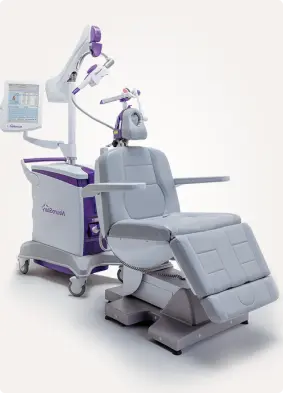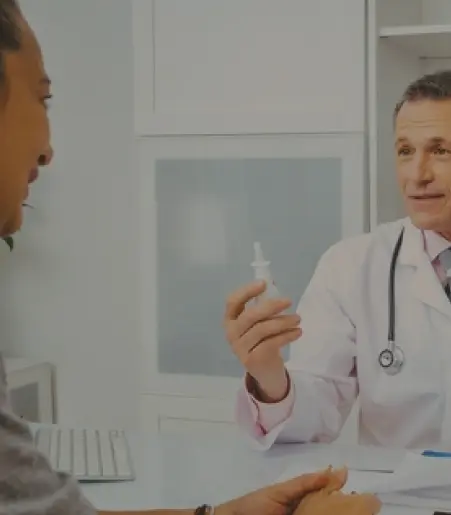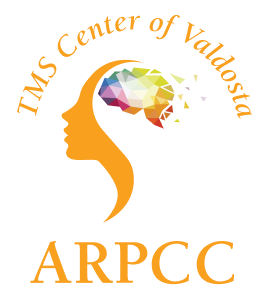Our Services
We are a premiere Psychiatric and Counseling Center in South Georgia. We provide mental health services for individuals who are struggling with a variety of mental health concerns such as depression, anxiety, bipolar disorder, and others.

TMS Therapy
Telehealth
Medication Management
Therapy
Suboxone
SPRAVATO®
GeneSight Genetic Testing
TOVA

TMS Therapy
TMS therapy is a non-invasive treatment option for depression and other mental health conditions that utilizes magnetic stimulation to target specific areas of the brain.
Our center is proud to offer TMS therapy as a safe, effective, and drug-free alternative to traditional depression treatments.
Our highly trained and compassionate team of experts will work with you to design a personalized treatment plan to meet your specific needs and goals.
We are dedicated to helping our patients achieve better mental health and overall well-being.
Our center is proud to offer TMS therapy as a safe, effective, and drug-free alternative to traditional depression treatments.
Our highly trained and compassionate team of experts will work with you to design a personalized treatment plan to meet your specific needs and goals.
We are dedicated to helping our patients achieve better mental health and overall well-being.

Telehealth
AR Psychiatric and Counseling Center offers Telehealth sessions for anyone in the state of Georgia.
All you need is a smartphone, tablet, or computer, and you can easily connect to one of our licensed providers.
Research supports the benefits of virtual counseling and psychiatric management are similar to those achieved in-person except in certain situations. Most insurance plans cover Telehealth services.
We utilize two HIPAA-secure software platforms called Doxy.me and Doximity.
These platforms work much like FaceTime or other popular video conferencing software.
Our counselors and prescribers will be in our offices or working from their home offices.
Privacy, security, and safety are our top priorities for our patients when considering telehealth options.
Software is free for you, and there will never be an added cost to your session.
If you have never used telehealth services before, you probably have a lot of questions. The information below should be able to answer all your questions about this safe, secure, and convenient way to continue or begin online counseling and psychiatric services.
Benefits of Telehealth:
* Regular access to your counselor/prescriber.
* Safe, easy, and secure.
* The comfort of your home.
* ( No added cost.
Possible Risks of Telehealth:
1. Reduced ability to perform certain aspects of a physical examination or evaluation.
2. Insufficient information (e.g., poor resolution of images or audio) to allow for appropriate medical decision-making by your provider.
3. Technical problems or failures interrupting or delaying treatment sessions.
4. Failure of security protections resulting in a breach of protected health information
All you need is a smartphone, tablet, or computer, and you can easily connect to one of our licensed providers.
Research supports the benefits of virtual counseling and psychiatric management are similar to those achieved in-person except in certain situations. Most insurance plans cover Telehealth services.
We utilize two HIPAA-secure software platforms called Doxy.me and Doximity.
These platforms work much like FaceTime or other popular video conferencing software.
Our counselors and prescribers will be in our offices or working from their home offices.
Privacy, security, and safety are our top priorities for our patients when considering telehealth options.
Software is free for you, and there will never be an added cost to your session.
If you have never used telehealth services before, you probably have a lot of questions. The information below should be able to answer all your questions about this safe, secure, and convenient way to continue or begin online counseling and psychiatric services.
Benefits of Telehealth:
* Regular access to your counselor/prescriber.
* Safe, easy, and secure.
* The comfort of your home.
* ( No added cost.
Possible Risks of Telehealth:
1. Reduced ability to perform certain aspects of a physical examination or evaluation.
2. Insufficient information (e.g., poor resolution of images or audio) to allow for appropriate medical decision-making by your provider.
3. Technical problems or failures interrupting or delaying treatment sessions.
4. Failure of security protections resulting in a breach of protected health information

Medication Management
Medication management involves seeing a healthcare provider (psychiatrist or advanced registered psychiatric nurse practitioner) who will obtain a detailed medical and psychiatric history, taking up to 45-60 minutes.
In a few cases, additional testing may be needed before making treatment recommendations when the diagnosis is unclear from history.
The healthcare provider will then explain the diagnosis, make treatment recommendations and answer any questions.
You will be scheduled with the clinician for follow-up medication management visits to assess your treatment response and monitor for side effects. In addition, the healthcare provider will meet with you to obtain information regarding your progress with the treatment plan.
In a few cases, additional testing may be needed before making treatment recommendations when the diagnosis is unclear from history.
The healthcare provider will then explain the diagnosis, make treatment recommendations and answer any questions.
You will be scheduled with the clinician for follow-up medication management visits to assess your treatment response and monitor for side effects. In addition, the healthcare provider will meet with you to obtain information regarding your progress with the treatment plan.

Therapy
Psychotherapy, or talk therapy, involves talking about your thoughts, feelings, and things troubling you in the therapy sessions, typically lasting 45 to 60 minutes.
It sometimes may involve discussing intense emotional issues, and you may find it difficult initially.
However, you will develop more confidence and become more comfortable as time passes.
Your therapist is there to help you become more comfortable during this process.
There are several different types of Psychotherapy, each employing a different therapeutic approach.
Sometimes, your therapist may combine different therapeutic techniques based on your needs or preferences.
The therapist may typically see you weekly or every two weeks.
In the first session, your therapist will gather information about you and your needs.
Sometimes this may require several sessions.
This initial assessment will determine the psychotherapy goals of the treatment, the frequency of sessions, and the total number of sessions needed.
Your therapist may ask you to do homework assignments or practice to build on what you have learned during therapy sessions.
Over time, addressing your issues in sessions should improve your mood and change your thinking and feelings about yourself.
It, in turn, should help you cope with your problems better.
It sometimes may involve discussing intense emotional issues, and you may find it difficult initially.
However, you will develop more confidence and become more comfortable as time passes.
Your therapist is there to help you become more comfortable during this process.
There are several different types of Psychotherapy, each employing a different therapeutic approach.
Sometimes, your therapist may combine different therapeutic techniques based on your needs or preferences.
The therapist may typically see you weekly or every two weeks.
In the first session, your therapist will gather information about you and your needs.
Sometimes this may require several sessions.
This initial assessment will determine the psychotherapy goals of the treatment, the frequency of sessions, and the total number of sessions needed.
Your therapist may ask you to do homework assignments or practice to build on what you have learned during therapy sessions.
Over time, addressing your issues in sessions should improve your mood and change your thinking and feelings about yourself.
It, in turn, should help you cope with your problems better.

Suboxone (buprenorphine
/naloxone)
Suboxone is a medication used in the treatment of opioid addiction.
It is typically prescribed as part of a comprehensive treatment program that includes behavioral therapy and support for recovery.
It is typically prescribed as part of a comprehensive treatment program that includes behavioral therapy and support for recovery.

SPRAVATO® (ESKETAMINE)
AR Psychiatric and Counseling Center offer SPRAVATO® Nasal Spray treatment at our Valdosta location.
SPRAVATO® (esketamine) Nasal Spray is FDA-approved and is indicated, in conjunction with an oral antidepressant, for the treatment of:
Treatment-resistant depression (TRD) in adults.
Depressive symptoms in adults with major depressive disorder (MDD) with acute suicidal ideation or behavior.
Patients with major depressive disorder who, despite trying at least two antidepressant treatments given at adequate doses for an adequate duration in the current episode, have not responded to treatment are considered to have treatment-resistant depression.
To help ensure patient safety, SPRAVATO® is administered under the supervision of a healthcare provider at a treatment center that is certified in the Spravato Risk Evaluation and Mitigation Strategy (REMS) Program.
Our Valdosta location is a REMS-Certified Treatment Center.
WHAT TO EXPECT
You self-administer SPRAVATO® nasal spray under the supervision of a health care provider in a certified doctor’s office or clinic, and the spray cannot be taken home.
Your healthcare provider will instruct you on operating the nasal spray device.
During and after each use of the nasal spray device, the healthcare provider will check on you and determine when you are ready to leave.
The SPRAVATO® labeling contains a Boxed Warning that cautions that patients are at risk for sedation and difficulty with attention, judgment and thinking (dissociation), abuse and misuse, and suicidal thoughts and behaviors after drug administration.
Because of these risks, you must be monitored by a healthcare provider for at least two hours after receiving your SPRAVATO® dose.
The most common side effects experienced by patients treated with SPRAVATO® in the clinical trials were disassociation, dizziness, nausea, sedation, vertigo, decreased feeling or sensitivity (hypoesthesia), anxiety, lethargy, increased blood pressure, vomiting, and feeling drunk.
SPRAVATO® may impair attention, judgment, thinking, reaction speed, and motor skills. Therefore, you should not drive or operate machinery until the next day after a restful sleep.
SPRAVATO® (esketamine) Nasal Spray is FDA-approved and is indicated, in conjunction with an oral antidepressant, for the treatment of:
Treatment-resistant depression (TRD) in adults.
Depressive symptoms in adults with major depressive disorder (MDD) with acute suicidal ideation or behavior.
Patients with major depressive disorder who, despite trying at least two antidepressant treatments given at adequate doses for an adequate duration in the current episode, have not responded to treatment are considered to have treatment-resistant depression.
To help ensure patient safety, SPRAVATO® is administered under the supervision of a healthcare provider at a treatment center that is certified in the Spravato Risk Evaluation and Mitigation Strategy (REMS) Program.
Our Valdosta location is a REMS-Certified Treatment Center.
WHAT TO EXPECT
You self-administer SPRAVATO® nasal spray under the supervision of a health care provider in a certified doctor’s office or clinic, and the spray cannot be taken home.
Your healthcare provider will instruct you on operating the nasal spray device.
During and after each use of the nasal spray device, the healthcare provider will check on you and determine when you are ready to leave.
The SPRAVATO® labeling contains a Boxed Warning that cautions that patients are at risk for sedation and difficulty with attention, judgment and thinking (dissociation), abuse and misuse, and suicidal thoughts and behaviors after drug administration.
Because of these risks, you must be monitored by a healthcare provider for at least two hours after receiving your SPRAVATO® dose.
The most common side effects experienced by patients treated with SPRAVATO® in the clinical trials were disassociation, dizziness, nausea, sedation, vertigo, decreased feeling or sensitivity (hypoesthesia), anxiety, lethargy, increased blood pressure, vomiting, and feeling drunk.
SPRAVATO® may impair attention, judgment, thinking, reaction speed, and motor skills. Therefore, you should not drive or operate machinery until the next day after a restful sleep.

GeneSight Genetic Testing
GeneSight genetic testing is a tool used to help healthcare professionals choose the most effective medication for an individual's mental health needs.
The test analyzes an individual's DNA to determine which medications may be best suited for them.
This personalized approach can help reduce the risk of trial and error when it comes to medication management.
The test analyzes an individual's DNA to determine which medications may be best suited for them.
This personalized approach can help reduce the risk of trial and error when it comes to medication management.

TOVA
The TOVA is an FDA-cleared computerized test used to support a diagnosis of attention deficit hyperactivity disorder (ADHD). It provides objective evidence and has shown to be reliable in detecting each subtype of ADHD: hyperactive-impulsive, inattentive, or combined.
What Do We Treat
In addition to the mental health conditions listed below, our clinic provides treatment for other conditions and comprehensive mental health services. Contact us today to develop an effective medication therapy management plan for yourself or your loved ones.
Depressive disorders
Anxiety disorders
Bipolar disorders
Obsessive compulsive disorder
Schizophrenia and other psychotic disorders
Dementia
Opioid use disorders
Alcohol and other substance use disorders
Eating disorders
Insomnia
Attention deficit hyperactivity disorder
Oppositional defiant disorder
Other mental health issues


Types of Therapy
At our therapy center, we offer a range of therapeutic approaches to help individuals cope with various mental health challenges and achieve their personal goals. Our team of licensed therapists is trained in various evidence-based therapies, including:
Biopsychosocial Initial Assessment
Crisis Intervention and Assessment
Rapid Trauma Resolution Strategies
Eye Movement Desensitization and Reprocessing (EMDR)
Adlerian Therapy
Cognitive Behavior Therapy
Cognitive Processing Therapy
Solution Focused Therapy
Dialectical Behavior Therapy
Prolonged Exposure Therapy
Family Systems Therapy
Blast Therapy
Recovery Oriented Cognitive Therapy
Play Therapy
Trauma-Focused Cognitive Behavior Therapy
Brainspotting Therapy
Marital Therapy
Each of these approaches has been proven effective in treating a wide range of mental health concerns, from anxiety and depression to trauma and substance abuse. We are dedicated to providing a safe and supportive environment where individuals can explore their thoughts, feelings, and behaviors, and develop the skills they need to live fulfilling lives.
The goal of a AR Psychiatric and Counseling Center is to provide individuals with the tools and support they need to manage their mental health and lead fulfilling lives.
Contact Us
